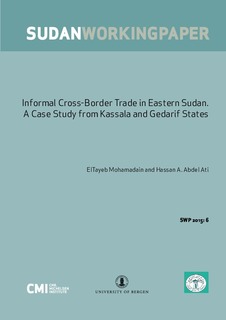Informal Cross-Border Trade in Eastern Sudan A Case Study from Kassala and Gedarif States
Working paper

Permanent lenke
http://hdl.handle.net/11250/2475070Utgivelsesdato
2015-01-01Metadata
Vis full innførselSamlinger
- Publications [1488]
Originalversjon
Bergen: Chr. Michelsen Institute (Sudan Working Paper SWP 2015:6) 22 p.Sammendrag
Informal trade in pre-colonial Africa, sometimes in the form of barter, was one of the mechanisms of social interaction between various ethnic groups and jurisdictions. It was an alternative to the state of hostility and a means of economic complementarities, particularly between nomadic and farming groups. With the appearance of political and administrative boundaries, levies and duties under colonial rule, informal trade became a way of reducing costs of traded items through the evasion of taxes, customs and other official charges. However, in some cases it was also a form of resistance to colonial rule and a refusal of recognition of what were considered as artificial borders. Informal cross-border trade (ICBT) was also used in some countries (e.g., South Africa) to dismantle the predominance of colonial structures (Mijere n.d.). The programme Assisting Regional Universities in Sudan and South Sudan (ARUSS) aims to build academic bridges between Sudan and South Sudan. The overall objective is to enhance the quality and relevance of teaching and research in regional universities. As part of the program, research is carried out on a number of topics which are deemed important for lasting peace and development within and between the two countries. Efforts are also made to influence policy debates and improve the basis for decision making in both countries as well as among international actors. ARUSS is supported by the Norwegian Ministry of Foreign Affairs.